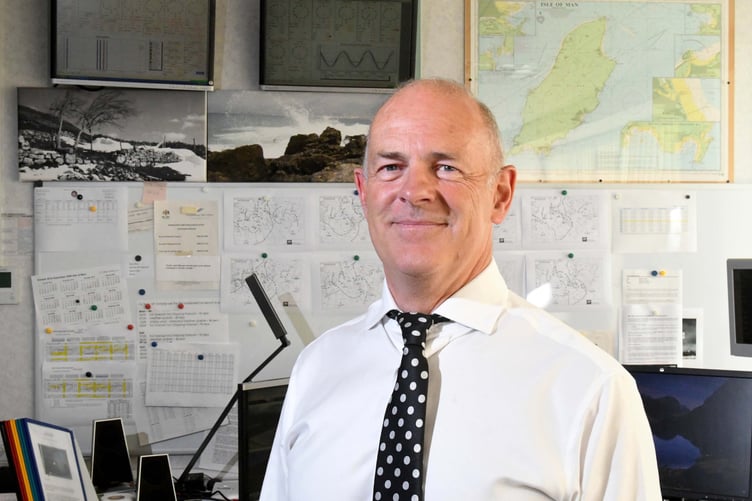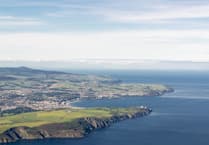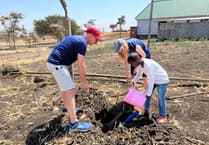Through wind, rain, snow and drought Adrian Cowin has been providing the island with detailed, essential local weather information from Ronaldsway Met Office, but this week he has made his last forecast.
Accolades and congratulations have been paid to Mr Cowin following his final day of four decades on Monday.
Based in Arbory, he joined in mid-July 1983 after returning home following a degree in applied physics at Preston Polytechnic.
His first role was assistant scientific officer at Ronaldsway Airport, but an opportunity for further training and a promotion to a forecaster came in 1985.
A further promotion to senior meteorological forecaster came in 2012.
Adrian explained that he has witnessed periods of significant change, especially in technology and science, which have led to different ways of working through his career.
He recalled that in his first few years the readings and measurements from weather instruments were mostly manual, recorded every half-an-hour by writing them in a large observations register and sending abbreviated reports to air traffic control.
Adrian said: ‘The official reports were also sent to the UK Met Office headquarters in Bracknell by using punched paper tape in a telex machine!
‘Observations from all weather stations in the British Isles were received back and we then had to decode and plot them on large charts before the duty forecaster could analyse all the information.
‘This busy routine was repeated every hour during everyday and night.’
Improvements
He added that thankfully over the next five to 25 years they had several improvements in equipment and communication, which allowed him and his colleagues to work more quickly and more efficiently.
The two-way flow of essential data and reports eventually became fully computerised, allowing Met Office staff to complete much of their work on screen.
Adrian also explained the importance of the development in satellite technology and power of the supercomputers.
He said: ‘There have also been continuous improvements in satellite technology, both in the global parameters coverage and the quality of the resolution from the various sensors, to give constant and accurate monitoring of the atmosphere and oceans.
‘The further improvements in the power of the supercomputers at Bracknell, and now at Exeter, as well as other international weather centres, to process the observational data has allowed higher resolution models of the atmosphere.
‘This allows us to produce useful forecasts quicker than 20 or 30 years ago, and now out to between seven and 10 days ahead.’
Adrian recalls that in the mid-1980s the Met Office was only able to give fairly accurate forecasts for just a few days ahead, sometimes five days in more settled weather situations.
Highlights
Whilst he says he has relished every day in the Met Office, there are some moments that stand out from his 40 years.
Adrian said some of the extreme weather events, strangely enough, have been his highlights.
He specifically mentioned the coastal and harbour flooding events of 2002 and 2014, the heavy rainfall events of 1985 and late 2015 to early 2016, and 2019, and the significant snowfall events including December 2010, January 2016 and in March 2013.
He added: ‘We believe that our timely warnings have made a difference in helping people to be ready for severe weather.’
It’s clear Adrian has enjoyed his work, and like his colleagues, has covered many of the duty 24/7 shifts providing updated reports, weather forecasts and warnings to the airport and Isle of Man as a whole.
However, we did discover one part of the job Mr Cowin might not miss.
He said: ‘I don’t particularly like the 10-hour night shifts. I estimate that I’ve done about 3,250 of them!
‘However, it’s important to monitor the weather continuously and provide information to produce the next forecasts and keep people advised about conditions for their work and safe travel.
‘There have been great improvements in our work with multi-agency partners, including the blue-light services, emergency planning, infrastructure and utilities.
‘Our phone is often busy as we take calls from event organisers, including the very important TT Races, but also give reports to airlines, aircraft pilots and marine customers as well as members of the public.’
Personal life
Away from his job at Ronaldsway, Adrian found time to be an Arbory parish commissioner for 17 years, and was also a governor at the primary schools in Ballasalla and Arbory, as well as at Castle Rushen High School for nearly 20 years.
He explained that he found it important to give something back to the community he lives in, and enjoyed interacting with the local authorities, the staff at schools and the younger people.
Still now he supports annual events in the island such as Laa Coulmb Killey, a more than 100- year-old festival in Arbory, and marshals at athletics events each year.
Besides his main role in Operational Meteorology, Adrian has developed a keen interest in climate change.
He said: ‘Our statistics confirm that climate change is clearly measurable in the Isle of Man and some of the effects are being observed here as well as around the British Isles and, more so, globally.
‘I hope many local people will get their chance to contribute to the good work already started in the island, to gradually improve or strengthen our infrastructure, whilst still looking at other important issues that will affect our lives.
‘My retirement from the Met Office feels quite sad for me, but it’s actually a good time to leave the office in the safe hands of my younger professional colleagues.
‘I’m happily looking forward to spending more time with my family, walking our beagle, doing more bike rides, and enjoying some travel around the British Isles over the next several years.’


.jpeg?width=209&height=140&crop=209:145,smart&quality=75)

-(1).jpeg?width=209&height=140&crop=209:145,smart&quality=75)
Comments
This article has no comments yet. Be the first to leave a comment.